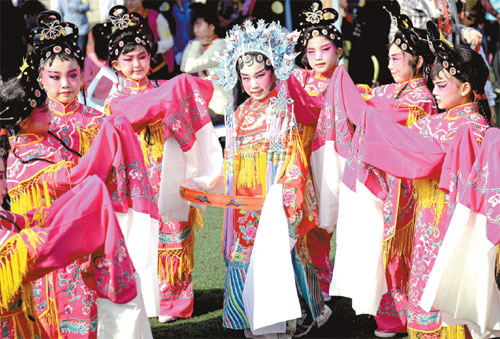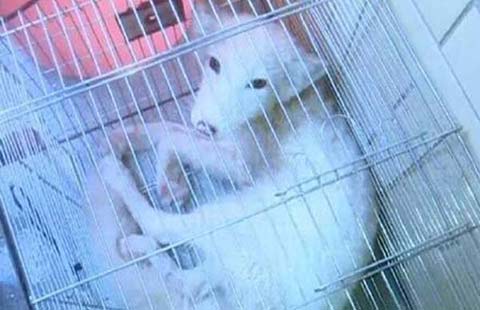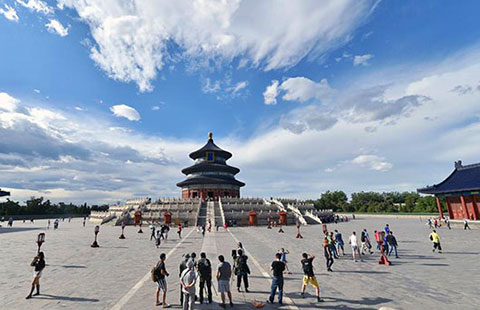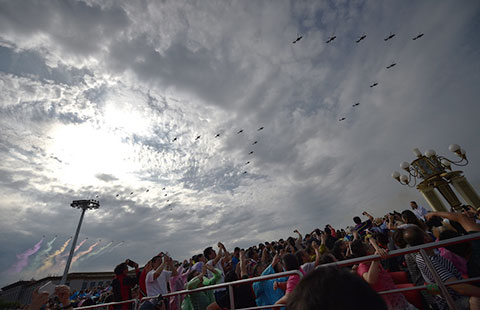Ancient opera looks to strike a chord with younger audiences
By Zhu Lixin and Ma Chenguang (China Daily) Updated: 2015-07-15 07:59
|
Primary school students showcase what they have learned at an Anhui Opera talent class at an educational event in Hefei, Anhui province, in 2014. [Zhang Duan / Xinhua] |
In 1790, Imperial China was ablaze with excitement about the 80th birthday of the Qianlong Emperor, and artists, entertainers, actors, dancers and performers from across the country were ordered to travel to Beijing and help celebrate the momentous event. Four opera troupes from East China's Anhui province were among the performers the emperor had commissioned, and when the celebrations finally came to an end, they decided to remain in the capital.
The decision was to prove a seminal moment in the evolution of one of China's most widely recognized cultural treasures: In the late 1820s, the troupes began giving joint performances with the best troupes in Hubei province and eventually developed the style that modern-day devotees recognize as Peking Opera.
This year marks the 225th anniversary of the troupes' participation, and in memory of their achievements and contribution to Chinese life, Anhui's cultural department arranged a monthlong celebration that culminated with the province's best opera troupes performing in Beijing.
One of the troupes performed The Psycho, "Jinghunji" in Chinese, an adaptation of Macbeth, one of Shakespeare's darkest and most powerful works. Set in Scotland, the play illustrates the damaging physical and psychological effects of political ambition on those who seek power for its own sake.
The adaptation, which premiered in 2013 after more than a year in preparation, is set in China during the Spring and Autumn Period (770 - 476 BC), and although some minor changes were required to make the story better fit the Chinese background, the plot remains faithful to the original.
Producer Li Longbin said the adaptation was partly aimed at the younger generation and foreigners, because while Peking Opera is revered as China's "national essence", Anhui Opera is on the verge of dying out.
Change and decline
Before the founding of the People's Republic of China in 1949, Anhui Opera was known as "Hui-diao", which translates loosely as "Anhui tune", but that was changed to "Huiju", meaning "Anhui Opera". In 1956, the Anhui Provincial Opera Troupe of Anhui Opera was established, and it trained dozens of famous artists, some of whom performed for former top leaders, such as Chairman Mao Zedong, and won great acclaim.
Zhang Qixiang, 71, one of the best-known "first-generation" of Anhui Opera performers, has expressed his concerns about the state of the form on many occasions. Nine years ago, he told a local newspaper, "The provincial troupe has been serving as a brand, but we don't have enough products to make the brand memorable to the audience".
It seems that Zhang was right to be worried:
The Psycho is one of just a handful of new works that have been created specifically for the genre since he gave that interview in 2006.
The dearth of new works has led to fewer performances and, inevitably, lower standards. "As a result, actors and actresses don't have enough chances to practice on stage", said Wang Danhong, an Anhui performer, who has garnered praise both in China and internationally for more than 30 years. She has won China's most-prestigious drama award, the Chinese Plum Award, and is seen as an "inheritor" of Anhui Opera, which was listed as part of the nation's intangible cultural heritage in 2006.
"I think I was born to perform Anhui Opera - which has brought me so many honors in the past 30 years - so I have to do something to save the form from dying out," she said.
- Delegation salutes Tibet anniversary
- Officials are told to act as anti-graft watchdogs
- Great Wall safeguarded in united action
- Vice minister pledges more efforts to improve air quality
- Beijing’s efforts to control air pollution start to pay off
- China's military committed to reform
- Netizens rip singer over baby photos
- Central govt's growing support for Tibet
- Monument to be built on Tianjin blast site
- China and Russia seal raft of energy deals








